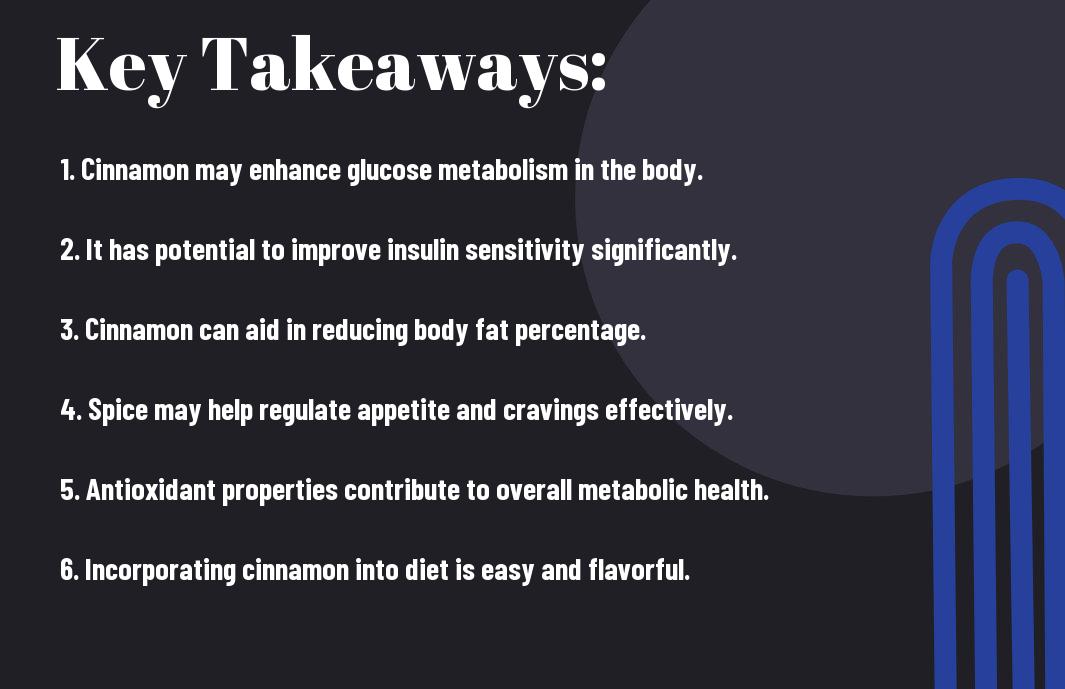Over the years, cinnamon has gained popularity not just for its delightful flavor but also for its potential health benefits, particularly concerning metabolism and weight management. You may be curious about how this aromatic spice can influence your body’s processes, enhance insulin sensitivity, and aid in weight loss efforts. In this blog post, we will research into the science behind cinnamon’s effects on metabolism, providing you with insights that can help you make informed dietary choices for your health journey.
Key Takeaways:
- Cinnamon and Metabolism: Cinnamon may help enhance metabolic processes, potentially aiding in weight management.
- Blood Sugar Regulation: It has properties that can improve blood sugar levels, which can lead to reduced fat storage.
- Anti-Inflammatory Effects: The anti-inflammatory properties of cinnamon may support better overall metabolic health.
- Improved Insulin Sensitivity: Regular consumption of cinnamon may boost insulin sensitivity, facilitating better glucose metabolism.
- Appetite Control: Cinnamon may help regulate appetite, making it easier to control cravings and manage portion sizes.
- Thermogenic Properties: Some studies suggest that cinnamon increases thermogenesis, which helps burn more calories.
- Complementary to Diet and Exercise: While cinnamon can support metabolism, it works best in conjunction with a balanced diet and regular physical activity.

Understanding Metabolism
A key aspect of your overall health is metabolism, which encompasses the chemical processes that convert food into energy. Your metabolism influences how efficiently your body burns calories, impacts weight management, and determines how effectively you store nutrients. By understanding your metabolism, you can make informed decisions about your diet and lifestyle to support your health goals.
The Role of Metabolism in Weight Management
An efficient metabolism is vital for maintaining a healthy weight. If your metabolism burns calories rapidly, you can enjoy a wider range of foods without gaining weight. Conversely, a sluggish metabolism may lead to weight gain, even with limited caloric intake, highlighting the importance of understanding how to optimize your metabolic rate.
Factors Influencing Metabolism
With numerous elements affecting your metabolism, it’s important to know what contributes to its efficiency. Factors such as age, muscle mass, and activity level play significant roles, including:
- Your basal metabolic rate, which decreases with age.
- The amount of muscle you have; more muscle means more calories burned at rest.
- Your level of physical activity—the more active you are, the higher your metabolic rate.
- Hormonal influences that can either enhance or hinder your metabolism.
- Your diet, as certain foods can boost metabolic rate.
Perceiving these factors can empower you to make adjustments that support a more active metabolism.
Also, your metabolism is not a fixed entity and can be influenced by various lifestyle changes. Factors like stress, sleep quality, and hydration can significantly impact your metabolic efficiency. Consider these additional influences:
- Your stress levels, as elevated stress can lead to hormonal shifts that slow metabolism.
- The quality of sleep you get, since poor sleep can negatively affect metabolic processes.
- Your hydration status, as dehydration can impair your metabolic rate.
- Dietary choices, specifically the balance of macronutrients consumed.
Perceiving the interplay between these factors allows you to tailor your approach toward optimizing your metabolism for better weight management.


Cinnamon: An Overview
Any exploration of metabolism and weight management should consider Does Cinnamon Increase Metabolism?. This aromatic spice, derived from the bark of Cinnamomum trees, is not only a popular culinary ingredient but also has potential health benefits. Known for its distinctive flavor, cinnamon has gathered attention for its possible role in enhancing metabolic processes and aiding weight management, making it a fascinating addition to your diet.
Historical Uses of Cinnamon
Beside its current culinary applications, cinnamon has a rich history in traditional medicine. Ancient Egyptians used it in embalming processes, while other cultures valued it for its perceived medicinal properties. Throughout history, it has been associated with various health benefits, including digestive aid and anti-inflammatory effects, showcasing its importance in both cooking and wellness practices.
Nutritional Profile of Cinnamon
Against the backdrop of its historical significance, cinnamon boasts a remarkable nutritional profile. This spice is low in calories yet rich in antioxidants and imperative oils, which contribute beneficial effects to your body. Its components, including coumarin and cinnamaldehyde, may play a role in promoting metabolic health and improving glucose sensitivity.
Historical records highlight that cinnamon not only enhances flavors but also contains compounds that can positively influence your well-being. The antioxidants found in cinnamon help combat oxidative stress, while its potential effects on blood sugar balance could support weight management within your dietary regimen. Thus, incorporating cinnamon can be an attractive way to enhance your nutrition while enjoying its many health benefits.
Cinnamon and Metabolic Effects
Your exploration into how cinnamon influences metabolism reveals that cinnamon supplementation positively affects obesity and helps improve metabolic processes. This spice is not only flavorful but may aid your body in managing weight by enhancing your metabolic rate and supporting healthy body composition.
How Cinnamon Affects Blood Sugar Levels
Beside its metabolic benefits, cinnamon is noted for its ability to stabilize blood sugar levels. Regular consumption of this spice can reduce post-meal blood sugar spikes, making it a valuable addition to your diet if you’re looking to maintain steady energy levels throughout the day.
Cinnamon’s Impact on Insulin Sensitivity
By incorporating cinnamon into your daily routine, you can potentially enhance your insulin sensitivity. This is particularly beneficial as improved sensitivity allows your body to utilize insulin more effectively, contributing to better regulation of glucose levels in your bloodstream.
A recent study suggests that cinnamon extracts can increase insulin receptor activity, promoting healthier glucose metabolism. This means when you consume cinnamon, it may help your cells respond more efficiently to insulin, potentially lowering your risk of insulin resistance and type 2 diabetes. Integrating this spice into your meals could be a simple yet effective strategy for improving your overall metabolic health.

Cinnamon’s Role in Weight Management
After exploring various dietary options, you may find cinnamon to be an appealing addition to your weight management plan. This flavorful spice not only enhances the taste of your meals but also has potential benefits for your metabolism and appetite control. By incorporating cinnamon into your routine, you might experience support in your weight loss journey, making it a delicious ally in achieving your goals.
Research Evidence on Cinnamon and Weight Loss
Around the globe, researchers have been investigating the effects of cinnamon on weight loss and metabolism. Some studies have indicated that cinnamon supplementation can lead to a reduction in body weight and waist circumference. While results can vary, the emerging evidence suggests that adding cinnamon to your diet may yield beneficial outcomes for your weight management efforts.
Mechanisms Behind Cinnamon’s Weight-Loss Benefits
Evidence suggests that cinnamon influences weight loss through several biological mechanisms. Cinnamon may help regulate blood sugar levels, leading to improved insulin sensitivity and decreased fat storage. Additionally, it has thermogenic properties that can boost metabolism, aiding in the burning of calories. By incorporating cinnamon into your diet, you may enhance your body’s ability to utilize energy efficiently, supporting your weight management goals.
Loss of weight can be attributed to several mechanisms activated by cinnamon. For instance, it aids in controlling the release of glucose into the bloodstream, which can help curb cravings and reduce overall calorie intake. The spice’s anti-inflammatory properties may also contribute to improved metabolic health and fat oxidation. By understanding these mechanisms, you can better appreciate how including cinnamon in your diet might assist in achieving your weight loss objectives.
Recommended Dosages and Consumption Methods
Unlike many spices, cinnamon can have a significant impact on your metabolism and weight management when consumed appropriately. Studies suggest a daily dose of 1 to 6 grams (approximately 0.5 to 2 teaspoons) of cinnamon is effective. For more insight, check out this article on how Cinnamon Has a Surprising Health Benefit. Always start with a small amount, and gradually increase it to find what works best for you.
Effective Ways to Incorporate Cinnamon into Your Diet
Above all, incorporating cinnamon into your diet can be both enjoyable and beneficial. You can sprinkle it on your morning oatmeal, blend it into smoothies, or add it to baked goods. Additionally, steering clear of processed sugars and using cinnamon as a natural sweetener enhances both flavor and health benefits.
Safety and Potential Side Effects
Along with its benefits, it’s important to be aware of the safety and potential side effects of cinnamon. In moderation, cinnamon is generally safe for most people, but high doses may lead to gastrointestinal issues or allergic reactions. Always consult a healthcare professional if you’re considering high-dose cinnamon, especially if you have underlying health conditions.
Into further detail, while cinnamon is mostly safe, certain individuals should take precautions, particularly those with liver conditions or allergies. Coumarin, a compound in some cinnamon varieties, can be harmful in large quantities over time. Therefore, sourcing Ceylon cinnamon, which contains less coumarin than Cassia cinnamon, is wise. Always pay attention to how your body reacts, and don’t hesitate to seek medical advice if you experience unusual symptoms.
Future Research Directions
To enhance our understanding of cinnamon’s impact on metabolism and weight management, future research must explore the mechanisms by which cinnamon influences bodily processes. This includes investigating its effects on insulin sensitivity, fat oxidation, and appetite regulation, as well as determining optimal dosages for effectiveness.
Current Gaps in Knowledge
Future research must address the limited understanding of how different types of cinnamon (e.g., Ceylon vs. Cassia) affect metabolic outcomes. Additionally, more studies are needed to clarify the long-term effects of cinnamon consumption on weight and to identify individual factors that may influence its efficacy.
Proposed Studies and Areas of Focus
Among the promising areas for future studies is the investigation of cinnamon’s synergistic effects with other dietary components. Researchers could also focus on broader population samples, examining how variables like age, gender, and health status affect cinnamon’s metabolic benefits.
Indeed, such studies could reveal how specific combinations of cinnamon with other nutrients enhance its health benefits. You may find it valuable to know that understanding the physiological responses in different demographics can help tailor dietary interventions effectively. This will not only deepen your comprehension of cinnamon’s role but also pave the way for practical recommendations that can assist in weight management and improving metabolic health.
Final Words
On the whole, incorporating cinnamon into your diet may positively influence your metabolism and weight management efforts. Its potential to enhance insulin sensitivity and regulate blood sugar levels can aid in controlling appetite and promoting fat burning. By adding this flavorful spice to your meals or beverages, you might find it a simple yet effective strategy to support your health and wellness journey. Always consider pairing cinnamon with a balanced diet and regular exercise for the best results.
FAQ
Q: What is cinnamon and how does it relate to metabolism?
A: Cinnamon is a popular spice derived from the bark of Cinnamomum trees. It has been shown to have several health benefits, including potential effects on metabolism. Studies suggest that cinnamon can enhance insulin sensitivity and improve glucose metabolism, which may help regulate body weight and support metabolic function.
Q: Can cinnamon aid in weight loss?
A: While cinnamon alone is not a magic weight loss solution, it can be a supportive element in a balanced diet. By improving blood sugar levels and enhancing insulin sensitivity, cinnamon may help reduce cravings and support fat loss. When combined with a healthy diet and regular exercise, it could contribute positively to weight management.
Q: How should I consume cinnamon for its metabolism-boosting effects?
A: Cinnamon can be consumed in various ways, such as sprinkling it on oatmeal, adding it to smoothies, or incorporating it into baked goods. To maximize its benefits, aim for about half to one teaspoon of cinnamon daily. It’s best to use Ceylon cinnamon, as it contains lower levels of coumarin, which can be harmful in large amounts.
Q: Are there any side effects associated with consuming cinnamon?
A: For most people, consuming cinnamon in moderation is safe. However, excessive intake may lead to adverse effects, including gastrointestinal issues and liver damage due to the coumarin content in Cassia cinnamon. It’s advisable to consult with a healthcare provider if you have any underlying health conditions or are taking medications that may interact negatively.
Q: How does cinnamon impact blood sugar levels?
A: Cinnamon has been shown to lower blood sugar levels by improving insulin sensitivity and slowing the digestion of carbohydrates. This can lead to a more controlled release of glucose into the bloodstream, which can help in weight management and overall metabolic health.
Q: Can cinnamon help reduce belly fat specifically?
A: Some studies suggest that cinnamon may have a positive impact on abdominal fat. By improving insulin sensitivity and promoting healthy blood sugar levels, cinnamon could potentially help in reducing visceral fat when combined with a balanced diet and regular physical activity.
Q: Should I take cinnamon supplements or stick to using it as a spice?
A: While cinnamon supplements are available, using cinnamon as a spice in your diet is generally a safer and more enjoyable method to reap its benefits. Eating whole foods allows you to take advantage of the spice’s nutritional profile, and it integrates easily into a variety of dishes. If considering supplements, it’s best to consult with a healthcare professional to ensure they’re appropriate for your needs.


